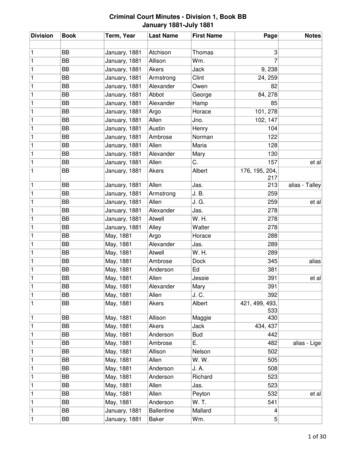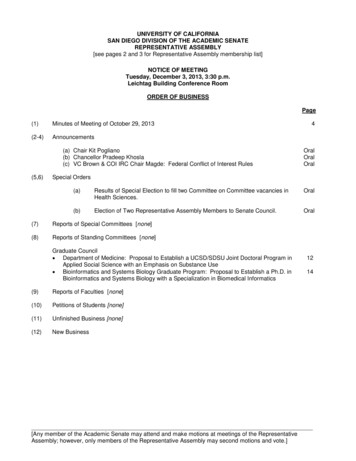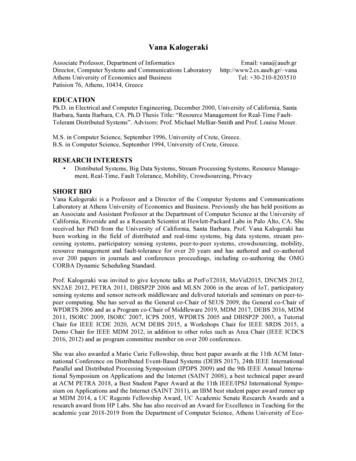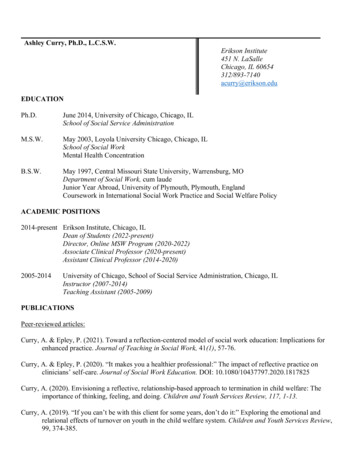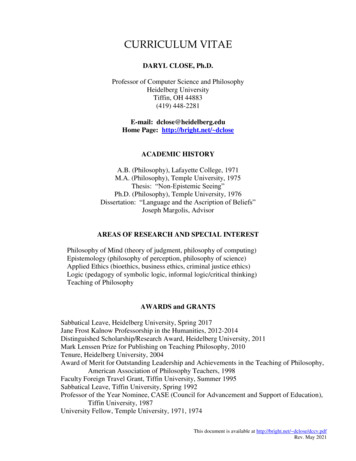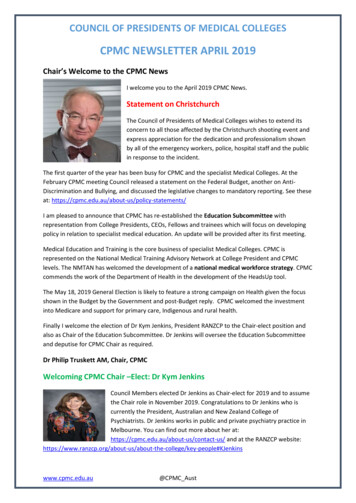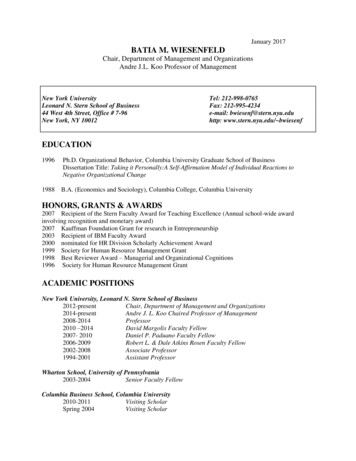
Transcription
January 2017BATIA M. WIESENFELDChair, Department of Management and OrganizationsAndre J.L. Koo Professor of ManagementNew York UniversityLeonard N. Stern School of Business44 West 4th Street, Office # 7-96New York, NY 10012Tel: 212-998-0765Fax: 212-995-4234e-mail: bwiesenf@stern.nyu.eduhttp: www.stern.nyu.edu/ bwiesenfEDUCATION1996Ph.D. Organizational Behavior, Columbia University Graduate School of BusinessDissertation Title: Taking it Personally:A Self-Affirmation Model of Individual Reactions toNegative Organizational Change1988B.A. (Economics and Sociology), Columbia College, Columbia UniversityHONORS, GRANTS & AWARDS2007 Recipient of the Stern Faculty Award for Teaching Excellence (Annual school-wide awardinvolving recognition and monetary award)2007 Kauffman Foundation Grant for research in Entrepreneurship2003 Recipient of IBM Faculty Award2000 nominated for HR Division Scholarly Achievement Award1999 Society for Human Resource Management Grant1998 Best Reviewer Award – Managerial and Organizational Cognitions1996 Society for Human Resource Management GrantACADEMIC POSITIONSNew York University, Leonard N. Stern School of Business2012-presentChair, Department of Management and Organizations2014-presentAndre J. L. Koo Chaired Professor of Management2008-2014Professor2010 –2014David Margolis Faculty Fellow2007- 2010Daniel P. Paduano Faculty Fellow2006-2009Robert L. & Dale Atkins Rosen Faculty Fellow2002-2008Associate Professor1994-2001Assistant ProfessorWharton School, University of Pennsylvania2003-2004Senior Faculty FellowColumbia Business School, Columbia University2010-2011Visiting ScholarSpring 2004Visiting Scholar
Columbia University, Columbia Graduate School of Business1989-1994Teaching AssistantPROFESSIONAL ACTIVITIESSenior Editor:Organization ScienceEditorial Boards:Administrative Science QuarterlyAcademy of Management PerspectivesOrganizational Psychology ReviewProfessional Leadership:Representative-at-Large, Organizational Behavior Division, Academy of Management 20042007.External reviewer: Wharton Management Department, Kellogg MORS Department, UT Austindoctoral programASQ Scholarly Contribution Award Committee Chair and MemberGeorge Terry Book Award Committee MemberOB Division Best Paper Award CommitteeConflict Management Division Best Paper Award CommitteeMemberships:Academy of ManagementAmerican Psychological AssociationSociety for Personality and Social PsychologySociety of Industrial and Organizational PsychologySCHOLARLY PUBLICATIONSWiesenfeld, B. M., Reyt, J. N., Brockner, J., & Trope, Y. (forthcoming). Construal Level Theoryin Organizational Research. Annual Review of Organizational Psychology and OrganizationalBehavior, 4(1).Reyt, J.N., Wiesenfeld, B.M., & Trope, Y. (2016). Big picture is better: The social implications ofconstrual level for advice taking. Organizational Behavior and Human Decision Processes, 135,22-31.Brockner, J., & Wiesenfeld, B. M. (2016). Self-as-object and self-as-subject in the workplace.Organizational Behavior and Human Decision Processes, 136, 36-46.Siegel, P. A., Brockner, J., Wiesenfeld, B. M., & Liu, Z. (2016). Non-Contingent SuccessReduces People Desire for Processes that Adhere to Principles of Fairness. Social JusticeResearch, 29(4), 375-401.2
Reyt, J. N., Rubineau, B., & Wiesenfeld, B. M. (2016, January). The Effect of Resumes' Level ofConcreteness on Candidate Evaluation. In Academy of Management Proceedings (Vol. 2016, No.1, p. 16694). Academy of Management.Brockner, J., Wiesenfeld, B. M., Siegel, P. A., Bobocel, D. R., & Liu, Z. (2015). Riding the fifthwave: Organizational justice as dependent variable. Research in Organizational Behavior, 35,103-121.Reyt, J.N. & Wiesenfeld, B.M. (2015). Seeing the forest for the trees: Exploratory learning,mobile technology, and knowledge workers’ boundary integration behaviors. Academy ofManagement Journal, 58, 3, 739-782.Fortin, M., Blader, S. L., Wiesenfeld, B. M., & Wheeler-Smith, S. L. (2015). Justice and Affect:A Dimensional Approach. The Oxford Handbook of Justice in the Workplace, 419.Reyt, J. N., Wiesenfeld, B. M., & Trope, Y. (2015, January). The Social Implications ofConstrual Level for Advice Taking and Status Conferral. In Academy of ManagementProceedings (Vol. 2015, No. 1, p. 12185). Academy of Management.Reyt, J. N., & Wiesenfeld, B. M. (2014, January). Seeing the Bigger Picture: Development andValidation of a Work-Based Construal Level Scale. In Academy of Management Proceedings(Vol. 2014, No. 1, p. 16010). Academy of Management.Bartel, C.B., & Wiesenfeld, B.M. (2013). The social negotiation of group prototype ambiguity indynamic organizational contexts. Academy of Management Review, 38, 4, 508-524.Polman, E., Pettit, N., Wiesenfeld, B.M. (2013). Effects of wrongdoer status on moral licensing.Journal of Experimental Social Psychology, 49, 4, 614-623.Blader, S., Wiesenfeld, B.M., Fortin, M. & Wheeler-Smith, S. (2013). Fairness lies in the heart ofthe beholder: How the social emotions of third parties influence reactions to injustice.Organizational Behavior and Human Decision Processes, 121, 1, 62-80.Bartel, C., Wrzesniewski, A. & Wiesenfeld, B.M. (2012). Knowing Where You Stand: PerceivedRespect, Organizational Identification and Physical Isolation Among Virtual Workers.Organization Science, 23, 3, 743-757.Wiesenfeld, B.M. & Brockner, J. (2012). On the reciprocal relationship between basic andapplied psychological theory. Organizational Psychology Review, 2, 2, 172-182.Mayhew, M., Simonoff, J., Baumol, W., Wiesenfeld, B.M., & Klein, M.W. (2012). Exploringinnovative entrepreneurship and its ties to higher education experiences. Research in HigherEducation, 53, 8, 831-859.Roloff, K., Wiesenfeld, B.M., & Brockner, J. (2011). The Role of Process Fairness Authenticityin 21st Century Negotiations. In B. Cohen & D. Shapiro, (Eds.), The Psychology of Negotiationsin 21st Century Work Organizations. SIOP Frontiers Series.Blader, S. L., Wiesenfeld, B., Rothman, R. & Wheeler-Smith, S. (2010). Social emotions andjustice: How the emotional fabric of groups determines justice enactment and reactions. In E. A.3
Mannix, M. A. Neale (Series Eds.) & E. Mullen (Vol. Ed.), Research on managing groups andteams: Fairness & Groups (pp. 29-62). Bingley, UK: Emerald Publishing.Brockner, J., Wiesenfeld, B.M., Diekmann, K. 2009. Towards a "Fairer" Conception of ProcessFairness: Why, When and How More May Not Be Better Than Less. In J.Walsh & A. Brief(Eds.), Annals of the Academy of Management.Forman, C., Ghose, A., & Wiesenfeld, B.M. 2008. Examining the relationship between reviewsand sales: The role of reviewer identity disclosure in online sales, Information Systems Research,19, 3, 1-23.Wiesenfeld, B.M., Wurthmann, K.A., & Hambrick, D.C. 2008. The stigmatization and devaluationof elites associated with corporate failure: A Process Model. Academy of Management Review. 33,1, 231-251.Finalist for best publication in Academy of Management Review, 2008.Wiesenfeld, B.M., Swann, W.B., Brockner, J. & Bartel, C. 2007. Is more fairness alwayspreferred? Self-esteem moderates reactions to procedural justice. Academy of ManagementJournal. 50, 5, 1235-1253.Finalist for best publication in Academy of Management Journal, 2007.Rothman, N., & Wiesenfeld, B. 2007. The social consequences of expressing emotionalambivalence in groups and teams. In E.A. Mannix, M.A. Neale & C.P. Anderson (Eds.),Research on Managing Groups and Teams, (Vol. 10; pp. 275-308), Elsevier.Brockner, J., & Wiesenfeld, B. 2005. How generalizable is the interactive relationship betweenoutcome favorability and procedural fairness? In J. Greenberg & J. Colquitt (Eds.), Handbook oforganizational justice: Fundamental questions about fairness in the workplace (pp.525-553).Hillsdale, N.J.: Erlbaum.Raghuram, S., Wiesenfeld, B.M. 2004. Work-nonwork conflict and job stress among virtualworkers. Human Resource Management. 43, 2-3, 259-278.Wiesenfeld, B.M., Wurthmann, K.A., & Hambrick, D.C. 2004. The stigmatization and devaluationof elites associated with corporate failure. Academy of Management Best Papers Proceedings.Raghuram, S., Wiesenfeld, B.M., & Garud, R. 2003. Technology enabled work: The role of selfefficacy in determining telecommuter adjustment and structuring behavior. Journal of VocationalBehavior, 63, 180-198.Martins, L.L., Milliken, F.J., Wiesenfeld, B.M., & Salgado, S.R. 2003. Group diversity andmembers' experiences: The role of the diversity of the organizational context. Group andOrganization Management.Wiesenfeld, B.M. & Hewlin, P. (2003). Splintered identities and organizational change. In B.Mannix, M. Neale & J. Polzer (Eds.), Research on Managing Groups and Teams, volume 5, pp. 2752.Raghuram, S., Garud, R., & Wiesenfeld, B. 2001. Factors contributing to virtual work adjustment.Journal of Management, 27, 3, 383-405.4
Wiesenfeld, B.M., Raghuram, S. & Garud, R. 2001. Organizational identification among virtualworkers: The role of need for affiliation and perceived work-based social support. Journal ofManagement, 27, 213-229.Wiesenfeld, B.M., Brockner, J., Petzall, B., Wolf, R., & Bailey, J. 2001. Stress and Coping AmongLayoff Survivors: A Self-Affirmation Analysis. Anxiety, Stress, and Coping: An InternationalJournal, 14, 15-34.Wiesenfeld, B.M., Brockner, J., & Thibault, V. 2000. Procedural fairness, managers’ self-esteem,and managerial behaviors following a layoff. Organizational Behavior and Human DecisionProcesses, 83, 1, 1-32.Article nominated for HR Division Scholarly Achievement Award, 2000.Raghuram, S., Wiesenfeld, B.M., & Garud, R. 2000. Adjustment to Telecommuting: Role of Selfefficacy and Structuring Behavior. Academy of Management Best Papers ProceedingsWiesenfeld, B.M., Brockner, J., & Martin, C. 1999. A self-affirmation analysis of survivors'reactions to unfair organizational downsizings. Journal of Experimental Social Psychology, 35,441-460. Paper based on my dissertation.Wiesenfeld, B.M., Raghuram, S., & Garud, R. 1999. Communication patterns as determinants oforganizational identification in a virtual organization. Organization Science, 10, 777-790.Wiesenfeld, B.M., Raghuram, S., & Garud, R. 1999. Managers in a virtual context: The experienceof self-threat and its effects on virtual work organizations. In C.L. Cooper & D. Rousseau (Eds.),Trends in Organizational Behavior (pp. 31-44). Chichester, UK: Wiley.Brockner, J., Heuer, L., Siegel, P.A., Wiesenfeld, B.M., Martin, C., Grover, S., Reed, T.,Bjorgvinsson, S. 1998. The moderating effect of self-esteem in reaction to voice: Convergingevidence from five studies. Journal of Personality and Social Psychology, 75, 2, 394-407.Wiesenfeld, B.M., & Brockner, J. 1998. Towards a psychology of contingent work. In J.J. Halpern& R.N. Stern (Eds.), Debating rationality: Nonrational aspects of organizational decision making(pp. 195-215), Ithaca, N.Y.: ILR Press.Wiesenfeld, B.M. 1997. Procedural unfairness and layoff survivors: Self-threat and coping in thecontext of organizational change. Social Justice Research, 10, 225-239.Brockner, J., Wiesenfeld, B.M., Stephan, J., Hurley, R., Grover, S., Reed, T., & DeWitt, R.L. 1997.The effects on layoff survivors of their fellow survivors’ reactions. Journal of Applied SocialPsychology, 27, 10, 835-863.Wiesenfeld, B.M., & Thibault, V. 1997. Managers are employees, too: Exploring the relationshipsbetween procedural fairness, managers’ self-perceptions, and managerial behaviors following alayoff. Academy of Management Best Papers Proceedings, 359-363.Brockner, J. & Wiesenfeld, B.M. 1996. An integrative framework for explaining reactions to adecision: The interactive effects of outcomes and procedures. Psychological Bulletin, 120, 189-208.5
Brockner, J., Wiesenfeld, B.M. & Martin, C. 1995. Decision Frame, Procedural Justice, andSurvivors' Reactions to Job Layoffs. Organizational Behavior and Human Decision Processes, 63, 1,59-68.Brockner, J., Wiesenfeld, B.M., Reed, T., Grover, S., & Martin, C. 1993. Interactive effect of jobcontent and context on the reactions of layoff survivors. Journal of Personality and SocialPsychology, 64, 187-197.Wiesenfeld, B.M. 1993. Bankruptcy and executives' loss of prestige: The role of attributions,Academy of Management Best Papers Proceedings, 227-236.Brockner, J., Wiesenfeld, B.M. & Raskas, D.F. 1993. Self-esteem and expectancy-valuediscrepancy: The effects of believing that you can (or can't) get what you want. In R.F. Baumeister(Ed.), Self-esteem: The puzzle of low self-regard. New York: Plenum.Brockner, J., & Wiesenfeld, B.M. 1993. Living on the edge (of social and organizationalpsychology): The effects of layoffs on those who remain. In J.K. Murnighan (Ed.), Socialpsychology in organizations: Advances in theory and research (pp. 119-140). Englewood Cliffs,N.J.: Prentice-Hall.ADDITIONAL PUBLICATIONSWiesenfeld, B.M., Rothman, N., Wheeler-Smith, S., & Galinsky, A. 2011. Why Fair Bosses FallBehind. Harvard Business Review, July/August.Wiesenfeld, B.M. & Cattani, G. 2010. Hollywood on Business. Harvard Business Review,October.Wiesenfeld, B.M. Business and Its Publics: Inquiry and Discourse, McGraw-Hill.Wiesenfeld, B.M. 2005. “The social life of emotions” (by L.Z. Tiedens & C.W. Leach (Eds.)), inAdministrative Science Quarterly, December, 2005.Wiesenfeld, B.M. 2004. The scarlet S. SternBusiness.Chen, Y., Freedman R., Morrison, E., Rogers, D., Shapira, Z., & Wiesenfeld, B. (Eds.) 1999. Casesand Readings in Managing Organizations, Pearson Custom Publishing.Wiesenfeld, B.M. 1998. Communication: The glue binding virtual employees. Stern Business,Summer.Wiesenfeld, B.M. 1997. Downsizing and the dissolution of trust. Stern Business, Spring/ Summer.Wiesenfeld, B.M. 1997. “Sizing down: Chronicle of a plant closing” (by L.M. Illes), in Industrialand Labor Relations Review, April, 50, 3, 521-522.Wiesenfeld, B.M., Mezias, S., Martins, L., & Bates, K. (Eds.). 1996. Introduction to Management,Simon & Schuster.6
WORKING PAPERSKim, H.Y. & Wiesenfeld, B.M. Who represents our group? The effects of prototype content onperceived status dispersion and social undermining. Personality and Social Psychology Bulletin.Requested second revision under review.Reyt, J.N., Rubineau, B., & Wiesenfeld, B.M. The effects of resume concreteness on candidateevaluation.Rothman, N., Wheeler-Smith, S. & Wiesenfeld, B.M. Gaining status but losing power: Thirdparty reactions to process fairness.WORK IN PROGRESSConstrual level and organizational change, with Xi Chen. Field experiment completed, follow-updata collection in process.Construal level and change, with Yair Berson and Shaul Oreg. Field study data collection inprogress; theory paper in development.Ambidexterity in construal level and entrepreneurial outcomes, with Jean-Nicolas Reyt andStephane Francioli. Study 1 (archival field data) completed, lab experiment being designed.INVITED PRESENTATIONSConstrual level in organizational behavior. Presentation to the Management area, London BusinessSchool, 2016.Construal level in organizational behavior. Presentation to the Management department, USCMarshall, 2016.Seeing the forest for the trees: Applying construal level theory to OB. Presentation to theOrganizational Behavior Unit, Harvard Business School, Harvard University, 2015.Seeing the forest for the trees: Applying construal level theory to OB. Presentation to theManagement Department, Boston College, 2015.Seeing the forest for the trees: Applying construal level theory to OB. Presentation to theInternational Business group, Business Department, Baruch College, City University of New York,2014.Seeing the forest for the trees: Applying construal level theory to OB. Presentation to theOrganizations Group, Olin School, Washington University, 2014.Seeing the forest for the trees: Exploratory learning, mobile technology, and knowledge workers’boundary integration behaviors. Presentation to the Management Department, George MasonSchool of Business, 2014.7
Gaining status but losing power: When and why unfair leaders are preferred, Presentation to theManagement Department, Wharton School, University of Pennsylvania, 2013.Gaining status but losing power: When and why unfair leaders are preferred, Presentation to theorganizational behavior faculty, Tepper School of Business, Carnegie Mellon University, 2012.Gaining status but losing power: When and why unfair leaders are preferred, Presentation to theorganizational behavior faculty, INSEAD, Fontainebleu, 2012.The allure of unfairness, Presentation to the Ross School of Business faculty, University ofMichigan, 2011.The allure of unfairness, Presentation to the College of Business faculty, University of Illinois atUrbana Champaign, 2010.The allure of unfairness, Presentation to the management faculty of Tel Aviv University, 2009.The allure of unfairness. Presentation to the faculty of Rennselaer Polytechnic Institute, 2008.The allure of unfairness. Presentation to the faculty of Goizueta Business School, EmoryUniversity, 2008.The allure of unfairness. Presentation to the faculty of McDonough School of Business,Georgetown University, 2007.The allure of unfairness. Presentation to the faculty of Yale School of Management, 2007.Is more fairness always preferred? Self-esteem moderates reactions to procedural justice. Paperpresented at the Society of Experimental Social Psychology meetings in Chicago, IL, 2007.The allure of unfairness. Presented to Managagement and Organizational Behavior Dept., LondonBusiness School, 2007.The allure of unfairness. Presented to Management Dept., University of Southern California, 2006.Who cares about fairness? Presented at Identity conference, Leiden University, Amsterdam, 2005.Stigmatization and devaluation of elites associated with corporate failure. Presented to Operationsand Information Management Department, Wharton School, University of Pennsylvania, 2005.Stigmatization and devaluation of elites associated with corporate failure. Presented toManagement Department, Columbia Business School, Columbia University, 2004.The lure of procedural unfairness. Presented to the Social Psychology Network, ColumbiaUniversity, 2004.Self-threat and employee reactions to organizational change. Presented to Society for Experimentaland Social Psychology, Boston, 2003.8
Stigmatization and devaluation of elites associated with corporate failure. Presented toManagement Department, Wharton School, University of Pennsylvania, 2003.Splintered identities and organizational change. Presented at the Research on Groups and Teamsconference, Cornell University, 2001.Coping with virtual work: Dynamic self-processes in the information age. Presented in DigitalEconomy Research seminar, Stern School of Business, New York University, 2001.Negotiating social identity exits: Evidence from virtual workers. Presented to the Davis Conferenceon Qualitative Research, University of California at Davis, 2001.Negotiating social identity exits: Evidence from virtual workers. Presented to the Psychologydepartment, Teachers College, Columbia University, 2001.Organizational change and the conflicted self. Presented to the Leadership and Organizationsgroup, Harvard Business School, Harvard University, 2000.Negotiating ambiguity: The effects of virtual work on individual identification. Presented to theIndustrial and Organizational Psychology faculty, Psychology Department, New York University,2000.Threat and Resilience in the Context of Organizational Change. Presented to the Managementfaculty, Fuqua School of Business, Duke University, 1998.Threat and Resilience in the Context of Organizational Change. Presented to the Managementfaculty, University of British Columbia, 1998.Managers are People, Too: Exploring the Relationships Between Procedural Fairness, Managers’Self-Evaluations, and Managerial Behaviors Following a Layoff. Presented to the Managementfaculty, Wharton School of Business, University of Pennsylvania, 1997.Strategic Implications of Group Esteem. Presented to the Management faculty, TechnionUniversity, Haifa, Israel, 1997.Group Esteem: Positive Collective Evaluations in Task-Oriented Groups. Presented to theManagement department, Hebrew University, Jerusalem, Israel, 1997.Group Esteem: Positive Collective Evaluations in Task-Oriented Groups. Presented to theManagement department, University of Chicago Graduate School of Business, 1997.The Strategic Implications of Group Esteem. Presented to the Organizational Psychologydepartment, Teachers College, Columbia University, 1996.Group esteem: Outcomes and Antecedents. Presented to the Yale School of Organizations andManagement, 1995.The interpersonal effects of self-affirmation: Managers and organizational change. Presented to theDepartment of Industrial and Organizational Psychology, New York University, 1994.9
Self esteem and organizational esteem. Presented to the Department of Industrial andOrganizational Psychology, Stevens Institute of Technology, 1992.TEACHING EXPERIENCEUndergraduate Courses:Management and Organizational Analysis, The Stern School, 1995-1999.Business and Its Publics, The Stern School, 2008-present.Masters Courses:Managing Organizational Behavior, The Stern School, New York University, 1995-1999Managing Organizations, The Stern School, New York University, 1999-PresentManaging Organizational Change, The Stern School, New York University 1999-Present.Doctoral Courses:Advanced Seminar in Organizational Behavior, Stern School, New York University.Executive ProgramsExecutive short programs: Leadership, Managing Organizational ChangeTrium Executive MBA; Leadership.Stern Executive MBA; Managing Organizations.Workshops and courses on:InnovationEthicsManaging Organizational ChangeLeadershipManagerial SkillsStrategy ImplementationDoctoral Thesis CommitteesAnat Hurvitz, Stern School of Business, 2017.Niranjan Janardhanan, McCombs School, UT Austin, 2017.Jeff Thomas, Management, Stern School of Business, 2017.Laura Reitman, Management, Stern School of Business, 2014.Jean-Nicolas Reyt, University of Paris, Dauphine. 2013.Hee Young Kim, Management, Stern School of Business, 2013. Chair.Xi Chen, Management, Stern School of Business, 2013.Sara Wheeler-Smith, Management, Stern School of Business, 2013. Chair.Tina Opie, Management, Stern School of Business, 2009.Jennifer Tosti, Management, Stern School of Business, 2009.10
Naomi Rothman, Management, Stern School of Business, 2008. ChairYephat Kivetz, Social Psychology, New York University, 2006.Sophie Leroy, Management, Stern School of Business, 2005.Yael Goverover, Department of Occupational Therapy, New York University, “The relationshipbetween categorization, deductive reasoning, self-awareness and instrumental activities of dailyliving among individuals who have brain injury,” 2001.Melissa S. Cardon, Management, Columbia Business School, “Organizational socialization andknowledge integration of newcomers: The role of anticipated tenure,” 2001.Victoria L.B. Luby, Industrial and Organizational Psychology, New York University, “Out in leftfield: A comparison of contributors towards employee work satisfaction in distributed andtraditional work settings,” 2001.Patricia Hewlin, Management, Stern School of Business, “And the award for best actor goes to . . .:Facades of conformity in organizational settings,” 2001.Amy D. Goodman, Industrial and Organizational Psychology, New York University, “Support for amultidimensional social identity construct,” 2001.Joy K. Turnheim, Management, “Impact of Culture of Identification on an Individual'sCommitment to an Organization,” 1999. Chair.Linda C. Santos, Industrial and Organizational Psychology, Hofstra University, "Effects ofIndividual and Group Feedback on Feedback Seeking Behavior," 1997.Luis Martins, Management, Stern School of Business, "Organizational Adaptation to ReputationalRankings: The Role of Managers’ Strategic Issue Interpretations," 1996.Masters Thesis CommitteesChris Jeffers, School of Continuing and Professional Studies, New York University, 2008, Advisor.J. Bradley Cummings, Industrial and Organizational Psychology, New York University, 1998,Advisor.Svali Bjorgvinsson, Industrial and Organizational Psychology, New York University, 1997,Advisor.Amy Cowgill, Information Systems, Clark University, 1997.PRESS/MEDIATelevision: Good Morning America, CNBC, CNN, BBC-TVRadio: NPR, Bloomberg11
Newspaper: Financial Times, New York Times, Wall Street Journal, USA Today, LA Times,Boston GlobeMagazine: BusinessWeek, Elle, Inc.SERVICEField: Senior Editor, Organization Science Committee to select Editor-In-Chief, Administrative Science Quarterly. Quinquennial Review of Wharton’s Management Department Five year review of Kellogg’s Organizations Area Seven year review of UT Austin’s Doctoral Program in Strategic Management and Organizations Faculty Fellow, OB Division Junior Faculty Workshop, 2017. Presentation: Crafting the Right Academic Job, OB Division Doctoral Consortium, 2014, 2015 PDW: Bringing Your Research into the Classroom, OMT Division, Academy of Management, 2014 PDW: Creating a meaningful career, Conflict Management Division, AoM, 2014 Elected Representative-At-Large, OB Division, Academy of Management, 2005-2008. Organized OB Junior Faculty Consortium, Philadelphia, 2007; co-organizer of OB Junior FacultyConsortium, Atlanta, 2006. Presenter/facilitator, OB Doctoral Consortium, Academy of Management, 2014, 2015 Editor’s panel, OB Junior Faculty Consortium, Academy of Management, 2011, 2012, 2013, 2014. Facilitator for OB/OMT Junior Faculty Consortium, Chicago, 1999; Washington, 2001. Co-organizer of Emotions in Organizational Life conference, 2006.New York University: Dean Search Committee Undergraduate Dean Search Committee Provosts’ Committee on Academic Priorities Faculty Grievance committees (Steinhardt, Liberal Studies) Conflict of Interest/Conflict of Commitment committee Chair, Israel Strategy Team, Bronfman Center Bronfman Center Advisory BoardStern: Chair, Department of Management and Organizations Strategic Working Group Steering Committee Instructor and Course Coordinator – Business and Its Publics core course for all Stern undergraduatestudents. Core course coordinator - Managing Organizations MBA block core course. Member, MBA Core Course Committee Member, Management Department Academic subommittee. Member, Management Department Recruiting subcommittee. Member of the Surveys Task Force – developed, analyzed, and reported results of MBA student survey. Member of MOB course curriculum review subcommittee to the MBA Curriculum review committee. Faculty Recruiting Committee member. Co-chair of Management Department Seminar Series, 1995-96. Conducted Management Department area presentations for full-time and part-time pre-term.12
Conducted sessions on Introduction to Case Analysis in full-time pre-term.Moderator of panels for conferences sponsored by Stern Women in Business Association andManagement Consulting Association.Core Course Coordinator for required undergraduate management course.Member of the Undergraduate Management Curriculum Revision committee.Faculty coordinator of "Stern M&Ms" (a mentoring program for Stern undergraduate students).Faculty presenter to prospective students, Opening Doors for Women, 2016, 2015, 2014.Faculty presenter to prospective students and their parents at Stern Sunday in the Square, Spring, 1997.Faculty leader of undergraduate corporate visitation.Faculty presenter to underrepresented minority prospective students.13
Andre J.L. Koo Professor of Management New York University Tel: 212-998-0765 Leonard N. Stern School of Business Fax: 212-995-4234 44 West 4th Street, Office # 7-96 e-mail: bwiesenf@stern.nyu.edu . 1996 Society for Human Resource Management Grant ACADEMIC POSITIONS New York University, Leonard N. Stern School of Business
